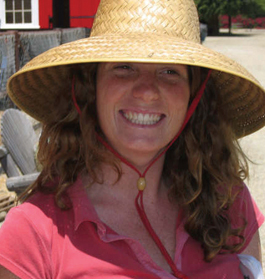home | metro santa cruz index | features | santa cruz | feature story

Made in the shade: For a modest fee, Kate Purcell will take the work out of being a locavore.
Victory Victuals
Once again, planting carrots and kale is a display of patriotism
By Roger Sideman
Eating locally raised food is a burgeoning trend. But who has time to get to the farmers market, let alone plant a garden? That's where Kate Purcell comes in. For a fee, Purcell will build an organic garden in your back yard, weed it weekly and even harvest the bounty, placing a box of vegetables on the back porch when she leaves.
As backyard gardens have been enjoying a renaissance across the country, "personal farmers" like Purcell are seeing their businesses blossom. Environmental concerns and the mainstreaming of the local food movement play a major part in the timing, according to Purcell and a chorus of other farmers-for-hire.
Gardening, says Purcell, is her job as well as her civic duty. It's one thing she as a citizen can do--"a way to reconnect with American values."
During World War II, "victory gardens" planted at the behest of the federal government helped reduce pressure on the public food supply brought on by the war effort. (In World War I, they were called "liberty gardens.") By 1943, Americans had planted more than 20 million victory gardens and reportedly produced 8 million tons of food that one promotional poster called "America's hidden weapon."
Now, at the White House, a different war is taking shape. Michelle Obama's garden is a victory garden of a new era--one that champions responsible and simple lifestyle choices in the face of some daunting economic and global challenges and serves as an learning tool for people who are inexperienced in nutrition and agriculture.
"Gardening can have a purpose, as the Obamas are demonstrating," says Purcell, whose Santa Cruz business, My Kitchen Gardens, designs and maintains custom gardens.
The new victory garden movement has captured the attention of people who want to lessen their reliance on mass-produced or imported food, reduce their carbon footprint, foster a sense of community or save a few coins on groceries.
The movement has the potential to feel as urgent as the victory gardens of old, says Christof Bernau, an instructor in the apprenticeship program at UC-Santa Cruz's Center for Agroecology and Sustainable Food Systems.
"There's a growing interest in taking charge of one's nutritional and food security, growing crops at home where you can harvest the best and freshest produce," says Bernau.
In a survey released in February, the National Garden Association predicts a 20 percent annual increase in first-time household food gardens. Seed companies have reported running out of some vegetables, according to the gardening association. One out of three households surveyed said the recession has motivated them to plant a garden.
"Seed saving for the next year helps make gardening economically wise," says Eve Siebley, founder of WorldFoodGarden.org, a social network for people starting neo-victory gardens.
The desire to grow food, however, crosses economic lines. While some people are struggling financially, others simply prefer lettuce over lawns. People are eager for healthful food close at hand. And they see how much better food grown at home tastes, says Batya Kagan, who runs Your Backyard Bounty, another personal farming service in Santa Cruz.
"A lot of my clients are first-timers motivated because having healthy food at your fingertips is an empowering feeling," she says.
Kagan and Purcell are typical of a new breed of business owners serving urban dwellers who insist on eating food grown close to home, but have no time or inclination to get their hands dirty. Call them lazy locavores.
Some clients want to be more hands-on but just need a little coaching. Should they cart in fresh dirt to fill raised beds or try to remediate blighted soil? Fertilize with chemicals, compost or organics? Start from seed or seedlings?
A different local service, Orchard Keepers, specializes in maintaining backyard fruit trees. Since a fruit tree usually produces far more fruit than a household can use, many of the company's clients agree to donate the surplus to Village Harvest, a San Jose nonprofit.
"It's win-win because the owner gets better tree care and the fruit gets shared with those who need it," says Bernau.
Pasatiempo resident Rob Chesnut didn't have saving the world in mind when he hired Purcell to help establish a food garden for his family. But he celebrates the trend.
"I'm under no illusions that growing a little of our own food is going to save much money or make a big impact on the environment, but it's about accomplishing positive change together, with all of us participating in small ways," he says. "The Obamas have set a great example. It's nice to be a part of that."
Find Kate Purcell and Batya Kagan online at www.mykitchengardens.com and www.yourbackyardbounty.com.
Send a letter to the editor about this story.
|
|
|
|
|
|